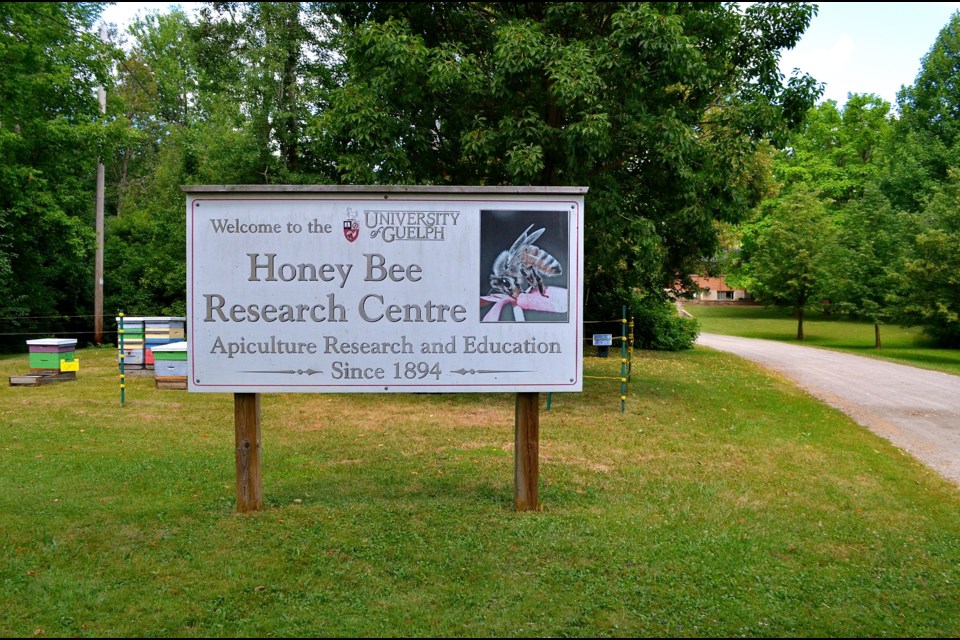Public interest in honeybees and other pollinators has never been higher and researchers at the University of Guelph are helping people get to know them even better.
“We are doing these drop in tours where anyone that wants to can just show up every second Wednesday (first and third Wednesday of the month) through the spring and summer at 10 a.m.,” said Paul Kelly, research and apiary manager at the Honey Bee Research Centre at the U of G. “It is running through until mid-October and we start at the beginning of May.”
The tours are geared toward educating as well as clearing up many misconceptions about bees.
“The goal is to try and give people a sense of what bees are all about, how important they are in the environment and we really try to emphasize that they aren’t out to get us,” said Kelly. “They are actually pretty gentle and easy to work with.”
Kelly has been fascinated with bees since he was in grade school.
“My dad introduced me to a good friend of his, Honey Boy McLaughlin who was in his 80s but he was still called Honey Boy,” said Kelly. “He introduced me to bees in Grade 6 and I got into working with bees during my university career.”
Kelly has worked with bees in Alberta, BC, Nova Scotia and New Zealand.
“I kind of moved around learning the pollination business, the queen rearing business, honey sales and production,” he said. “There are many different aspects of beekeeping so, I have tried to garner quite a range of experience and then a job came up here and it was my dream job and I have been working at it for 32 years.”
His knowledge and passion for bees is reflected in the content and presentation of the tours.
“We do bee dances and demonstrations on how bees collect pollen and try to make it fun for all ages,” he said. “Then we come outside and we open up a beehive. We have people sitting in stationary positions so they aren’t a threat to the hives. We carry components of the colony over to people so they can have a nice close view of what goes on inside a hive.”
A common fear for many people is getting stung.
“We talk a little about bee stings,” he said. “I usually try to talk about that after the tour so we don’t build anticipation.”
Dispelling that fear is part of the tour experience according to Stephanie Otto an undergraduate student at the U of G who has worked at the Honey Bee Research Centre for three years.
“A lot of people think that bees are mean and they will sting you but when we bring them out into the backyard they see for themselves that the bees don’t want to have anything to do with you at all,” she said. “They just want to make their honey and go about their day. That’s when people kind of realize that they aren’t so bad after all.”
Otto is typically joined in the yard by her colleague Taylor Campbell, a U of G graduate and staff member at the Honey Bee Research Centre.
“I love sharing everything I know about bees with everyone because they are such a small insect with such a small brain yet they are just so smart,” said Campbell. “It is so interesting to hear about all the incredible things they do.”
They have noticed a growing interest in bees since 2007 when researchers identified a growing threat to bee and other pollinators’ populations and overall health due to a combination of factors collective described as Colony Collapse Disorder.
“There is a lot more awareness with the general community about colonies declining and having health problems,” said Otto. “They want know how they can help them and it is really nice to see media spread more awareness about bees and beekeepers.”
Kelly said there are 400 different species of bees in Ontario and that increased public concern and awareness about honeybees is a bit of a silver lining for all threatened populations.
“They are fascinating creatures so, we hit on some of the really interesting biological facts and we give people a real close encounter with bees,” he said. “We love doing it and the people that come for the tours really enjoy it too.”
Fore more information, please click here.
